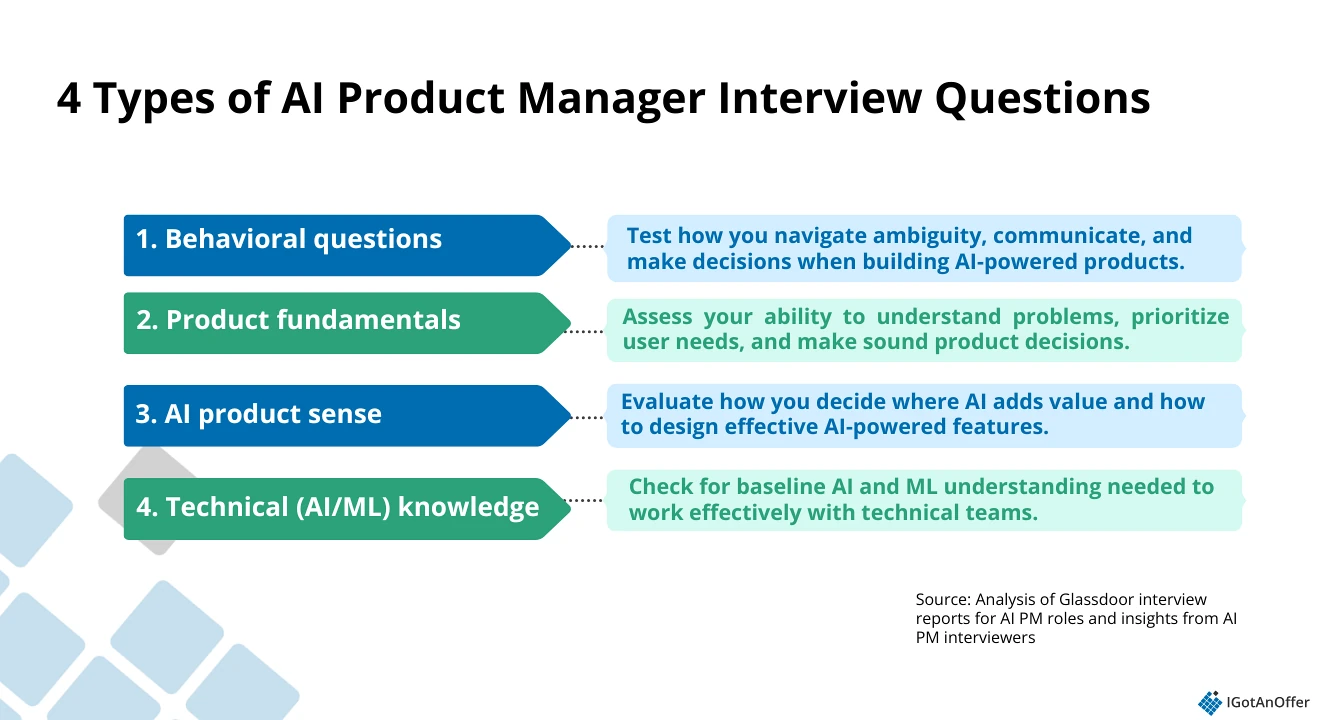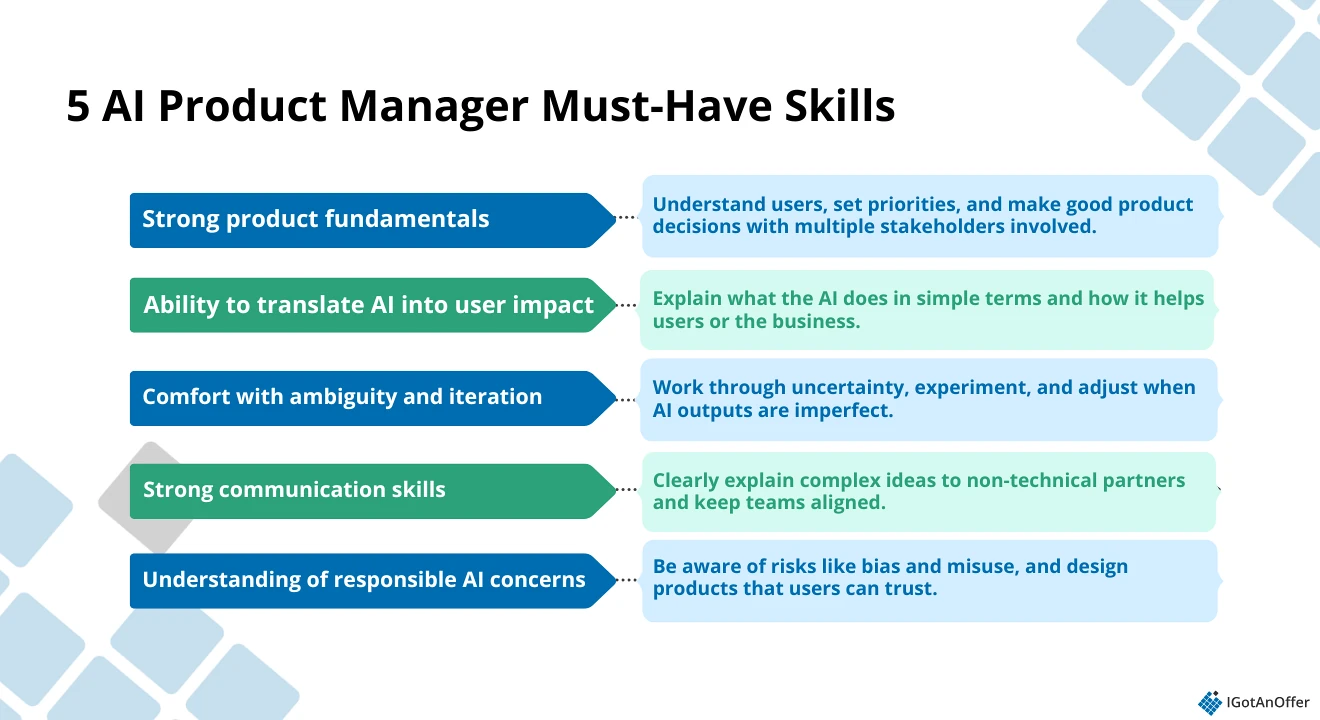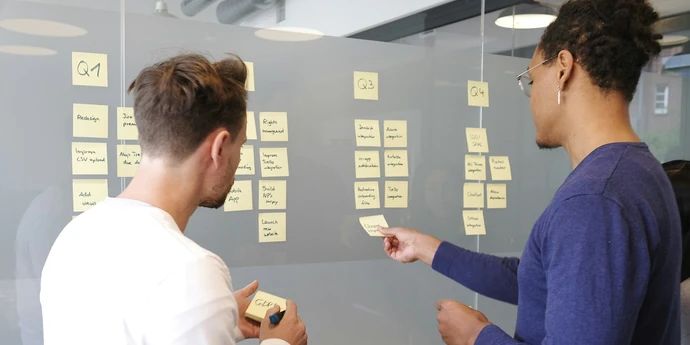The age of AI is upon us, and the demand for AI skills is growing. This is certainly true in the product management space. That’s why we’ve come up with this AI product manager interview guide.
To create this guide, we researched and categorized the real interview questions AI PM candidates typically get based on online reports.
We also talked to AI PM experts: Anik (Amazon GenAI Product Lead), Piyush (Microsoft Principal Group PM), Casey (eBay Sr. Technical PM), and Alan (ex-Meta Lead PM), and asked for their insights on what AI product management involves and how you can stand out.
Finally, we included a step-by-step prep plan and resources to help you approach your AI PM interviews with confidence.
Here’s a quick look at what we’ll cover:
- Common AI product manager interview questions
- What you need to know about AI product management
- How to prepare for AI PM interviews
Let’s get started!
Click here to practice 1-on-1with a PM interviewer
1. Common AI product manager interview questions↑

Below are lists of questions asked at AI PM interviews, gathered from Glassdoor reports. We’ve also included some questions our coaches, Anik, Piyush, and Casey, like to ask when interviewing AI PM candidates.
The first thing you need to know about AI product manager interviews is that you'll still be tested on your product fundamentals. So, you should expect a mix of standard PM questions and AI-focused ones during your interviews. For this article, we’ll be focusing on the AI-focused questions you could get.
Note that we’ve edited some questions for clarity.
1.1 Behavioral questions
Based on our analysis of reported questions, AI PMs get a lot of AI-related behavioral questions, on top of the standard ones. In some cases, these questions could be phrased in the hypothetical.
Interviewers use these questions to test for skills that are necessary to thrive in an AI-focused role, i.e., problem-solving, comfort with ambiguity, communication skills, influence without authority, user empathy, ability to simplify complexity, cross-functional collaboration, and resilience.
You could also get hypothetical questions surrounding the ethics of AI, so be sure to read up on the topic beforehand.
Let’s take a look at some examples.
Example AI PM behavioral/hypothetical interview questions
- Tell me about a time you used data or experimentation to drive a decision in a high-ambiguity environment.
- How would you explain a complex AI system to a non-technical stakeholder and get buy-in?
- Tell me about an AI-powered feature you launched where the model had significant technical limitations. How did you design the CX to manage user expectations and maintain trust?
- Tell me a time when you had to work with models that were producing inconsistent predictions. How did you work with the scientists to address them?
- Share an experience where you conducted A/B testing for an AI product.
For more practice questions and an answer framework, check out our article on product manager behavioral interview questions.
1.2 Product fundamentals questions
To succeed as an AI PM, you need to demonstrate strong product fundamentals, i.e., understanding the problem you are trying to solve and identifying the best way to start solving that problem. These require strong user empathy and strategic user segmentation.
When asking AI product questions, interviewers like Anik will likely start with situational product questions and then introduce the AI factor. “This helps me understand the candidate's strategic thought process for integrating AI into a solution, rather than just forcing an AI-first answer.”
Let’s take a look at some example questions.
Example AI PM product fundamentals interview questions
- Given our company's goal to increase customer engagement by 30%, what would you do? Where would you deploy an AI solution, and how would you prove it was a better approach than a non-AI solution?
- How do you utilize AI capabilities to help product discovery and user retention?
- What strategies would you use to ensure product defensibility in an AI-saturated market?
- Imagine the model you launched is underperforming—how do you triage and prioritize next steps?
1.3 AI product sense
Beyond the fundamentals, you’ll also be tested on AI product sense. This means having a solid understanding of the company’s latest AI products and how they’re positioned.
Interviewers may probe you into your ability to further innovate on their existing products, identify gaps and flaws in the system, and make smart design decisions that help the company maintain its competitive edge.
In an AI product sense interview, you may be asked to design an AI-powered feature or product from scratch. Be prepared to create a high-level product design with specific AI features, explain trade-offs around rollout and risks, and discuss why the solution makes sense for both users and the business.
At Meta, in particular, AI product sense questions have increasingly appeared in the interview loop, according to this LinkedIn post. These questions test how well you collaborate with Meta’s AI products, including your ability to guide the AI effectively and critically evaluate its outputs.
AI product sense questions aren’t limited to AI PM roles. They can also come up in standard PM interviews, especially for domain-specific roles.
According to Alan (ex-Meta lead product manager), candidates interviewing for a specific domain should expect to either speak with a domain expert or receive product sense questions tailored to that domain.
In addition to AI product sense, you may also get product improvement and strategy questions.
Example AI PM AI product sense interview questions
- Design a smart fridge for Google
- Given an AI-powered product facing usability challenges, how would you improve it?
- What goal would you set for an AI-only social network that OpenAI is building?
- What industry could benefit most from enterprise ChatGPT?
- What’s your favorite AI product, and why?
Given that you need to have a strong product foundation outside of your AI knowledge, expect to get standard product sense questions on top of AI-focused ones.
For this question category, we highly recommend studying our standard product sense and execution guides. These guides include example questions plus an answer framework:
1.4 Technical (AI/ML-related) knowledge questions
To qualify for an AI-focused PM role, you’ll need to demonstrate a baseline AI/ML knowledge, just enough to allow you to communicate effectively with engineers and data scientists.
Let’s take a look at some example questions.
Example AI PM technical knowledge interview questions
- What’s your criteria in selecting a model?
- How do you evaluate a prompt?
- How do you keep up to date with AI trends?
- What’s your understanding of the RAG (Retrieval-Augmented Generation) framework?
- Are you familiar with RLHF (Reinforcement Learning from Human Feedback)?
- Tell me what you know about DPO (Direct Preference Optimization).
- What’s your understanding of Generative AI?
- What are the essential differences between NN (Neural Networks) vs LLM (Large Language Models)?
- What are the strengths and weaknesses of classic ML models and the implications for the product?
- When will you use rule-based infrastructure vs. NN vs. LLM models?
Read our guide on technical product manager questions for a good answer framework and tips to ace this type of interview with confidence. For crash courses on ML topics like NN and LLM, Google has modules worth checking out.
If you’re applying for GenAI-focused roles, you might also find our Generative AI system design interview guide useful.
2. What you need to know about AI product management↑
In this section, let’s take a look at how AI product management compares to traditional PM, and the skills you’ll need to qualify.
2.1 AI PM vs. traditional PM
AI product managers and traditional product managers share the same purpose: to understand user problems and come up with solutions to address them.
How do they differ, then? Here are a few ways:
- Day-to-day work. According to Anik (Amazon GenAI Product Leader), one difference is the daily work. “It pivots from building deterministic software (where an input always produces a predictable output) to managing probabilistic systems that continuously learn and evolve.” This means adaptability and the ability to manage ambiguity are even more important skills for you to have to thrive as an AI PM.
- Evaluating the success of a product. In addition to traditional business KPIs that PMs use to measure for success, AI PMs need to monitor solution efficiency in terms of model performance metrics. “AI PMs identify customer scenarios or issue patterns and identify what signals/features should be included in the model, identify what the labels are, etc. They should also care about the prediction errors, their impact on the customer, and help prioritize the initiatives,” says Piyush (Microsoft Principal Group PM).
- Collaborators. A traditional PM will often work with engineers, UX designers, and others. Meanwhile, an AI PM will work very closely with ML scientists and applied scientists.
- Unique challenges. The AI domain in product management poses challenges different from the traditional PM role. They include “aligning product goals with evolving AI capabilities, handling uncertainty in model outputs, and ensuring responsible/ethical deployment,” says Casey (eBay Sr. Technical PM). Anik details these uncertainties in model outputs as “latency, or slow response times from complex models and hallucinations, or models generating factually incorrect but confident-sounding outputs.”
2.2 AI PM must-have skills

According to our AI PM experts, Anik, Piyush, and Casey, here are the skills you’ll need to demonstrate to stand out as an AI PM candidate:
Strong product fundamentals
“Before we even consider AI, we look for foundational product management expertise,” Anik says. This means you’ll need to show customer empathy and discovery, strategic thinking, prioritization, stakeholder management, and cross-functional leadership.
Ability to translate technical AI concepts into user impact
Depending on the specific AI PM role and company, the technical requirements may differ. However, the core requirement is the same across most companies: the ability to translate AI/ML concepts into user impact and business value.
At Amazon, for instance, Anik says they’re looking for a candidate with “a solid foundational understanding of the ML lifecycle, such as data requirements, model training, and evaluation metrics.”
For Piyush at Microsoft, “Strong algorithm and statistics background, and preferably experience with ML models.” He adds Gen AI experience is a plus, but emphasizes that his team is focused on Neural Net (NN) models, which are used far more widely.
Comfort with ambiguity and iteration
AI PMs need to show comfort with ambiguity as “AI products often require experimentation and resilience,” says Casey.
In addition to comfort with ambiguity, a great AI PM will understand the non-deterministic nature of AI outputs and demonstrate skills to address this fundamental nature of the tech.
These skills, according to Anik, include “A demonstrated ability to set realistic user expectations, design robust failure/fallback states in the user experience, and proactively address critical concerns around Responsible AI throughout the entire product lifecycle.”
Strong communication skills
“You need to have the ability to translate super technical jargon into simple terms,” Piyush says.
When assessing communication skills, Casey wants to see how a candidate breaks down technical concepts into simple analogies, tailors the message to a stakeholder’s goals, and balances transparency about risks/limitations with a clear articulation of value.
Understanding of Responsible AI concerns
There are a lot of concerns regarding the responsible use of AI, and AI PMs have to be on top of them. A good AI PM should be aware of and proactively address these complex concerns, which include algorithmic bias, fairness, and the explainability of the AI's decisions, which are critical for user trust and regulatory compliance.
3. How to prepare for AI PM interviews↑
As you can see from the complex questions above, there is a lot of ground to cover when it comes to AI PM interview preparation. So it’s best to take a systematic approach to make the most of your practice time.
Below are links to free resources and a plan to help you prepare for your AI PM interviews.
3.1 Know the PM interview process
When you get an interview for an AI PM role, you’ll still be evaluated on your PM fundamentals. Therefore, expect to undergo the same standard PM interview process.
The best way to prepare for the PM interview process is to familiarize yourself with how it works. Below, we have a list of our company-specific interview guides, where we walk you through everything you need to know to prepare:
- Google product manager interview guide
- Meta product manager interview guide
- Amazon product manager interview guide
- OpenAI product manager interview guide
- Microsoft product manager interview guide
- LinkedIn product manager interview guide
- Uber product manager interview guide
- Stripe product manager interview guide
- Lyft product manager interview guide
- Apple product manager interview guide
- TikTok product manager interview guide
- Coinbase product manager interview guide
- Airbnb product manager interview guide
- DoorDash product manager interview guide
- Nvidia product manager interview guide
- Spotify product manager interview guide
- Netflix product manager interview guide
- Capital One product manager interview guide
- Oracle product manager interview guide
To brush up on your product fundamentals, get started with our guides below:
- Product sense
- Product design
- Product improvement
- Product strategy
- Product execution
- Strategy questions
- Product metric questions
- Technical questions
- Estimation questions
- Prioritization questions
3.2 Dive deep into AI/ML
You need to strike a balance between strong product fundamentals and AI/ML foundational knowledge to succeed as an AI PM.
If you're new to the domain and wondering how to focus your AI/ML learning, here are some tips from our AI PM coaches, Anik, Piyush, and Casey:
Learn ML/AI concepts and AI-adjacent skills
You don’t need to learn how to code; you simply need to learn the basic science behind AI.
“This means understanding core ML concepts: what a model is, how it 'learns' from data (training), and the difference between giving it labeled examples versus letting it find patterns on its own,” Anik says.
Casey adds that you should also beef up on AI-adjacent skills, including data analysis, experimentation, and product metrics.
Build a portfolio of AI-adjacent projects
Casey suggests building a portfolio of AI-adjacent projects to demonstrate applied experience. Some projects you can tackle are recommendation systems, personalization, and automation.
Through hands-on AI projects, Anik says you’ll learn how to drive business value with AI. You can initiate these projects at your current job, as a side project, or as a capstone.
Learn how to design for uncertainty
When beefing up your AI knowledge, it’s important that you learn to design for failure. In a traditional PM role, software either works or crashes, but AI is always 'sort of right.'
To address this built-in uncertainty, Anik says, “The PM's job is to design the product experience to manage user expectations, clearly communicate when the AI might be wrong, and build reliable backup plans (like a human review) to maintain user trust.”
Learn prompt engineering
Piyush thinks that Gen AI experience is overrated for AI PMs, as anyone with a strong customer mindset and product thinking can become an effective Gen AI PM. What he does recommend strongly is learning how to do prompt engineering well.
To get started with your AI/ML deep dive, check out these free resources we’ve gathered:
- AI for Everyone (DeepLearning.ai)
- Machine Learning and Artificial Intelligence Training (Google)
- How AI changes product management (Reforge)
- GenAI Prompt Engineering: A Product Manager’s Guide
- Data Analysis for Product Managers (UserPilot)
- Ethics in AI: The New Frontier for Product Managers (ProdPad)
- Your Guide to Product Strategy (OpenAI’s Product Lead)
- How to Create an AI Product Roadmap (Aakash Gupta)
3.3 Learn about your target company’s products and AI initiatives
If you’ve already got a target company, make sure you read up on their products and AI initiatives. Most companies will have a specific landing page for their AI initiatives, so that’s a great place to start.
Meta
- Meta AI
- Meta annual reports and strategy presentations (by Meta)
- Meta's approach to tech trends (by CB Insights)
- How to write a great product strategy (with Meta Director)
- Google AI
- Google’s product management practices
- 42 Rules to Lead by from the Man Who Defined Google's Product Strategy
Amazon
- AI Innovation at Amazon
- The product model at Amazon (by Silicon Valley Product Group)
- Amazon’s working backwards method (by Product Plan)
Applying for a specific AI-focused tech company? You might want to check out these company-specific interview guides as well:
3.4 Practice mock interviews
Once you’re in command of the subject matter, you’ll want to practice answering questions.
You can start practicing by yourself. Act the part of the interviewer and interviewee. You can also record yourself to assess your performance.
This should just be the first part of your practice. Because by yourself, you can’t simulate thinking on your feet or the pressure of performing in front of a stranger. Plus, there are no unexpected follow-up questions and no feedback.
That’s why many candidates try to practice with friends or peers.
3.4.1 Practice with peers
If you have friends or peers who can do mock interviews with you, that's an option worth trying. It’s free, but be warned, you may come up against the following problems:
- It’s hard to know if the feedback you get is accurate
- They’re unlikely to have insider knowledge of interviews at your target company
- On peer platforms, people often waste your time by not showing up
For those reasons, many candidates skip peer mock interviews and go straight to mock interviews with an expert.
3.4.2 Practice with experienced AI PM interviewers
In our experience, practicing real interviews with experts who can give you company-specific feedback makes a huge difference.
Find an AI product manager interview coach so you can:
- Test yourself under real interview conditions
- Get accurate feedback from a real expert
- Build your confidence
- Get company-specific insights
- Learn how to tell the right stories, better.
- Save time by focusing your preparation
Landing a job at a big tech company often results in a $50,000 per year or more increase in total compensation. In our experience, three or four coaching sessions worth ~$500 make a significant difference in your ability to land the job. That’s an ROI of 100x!















